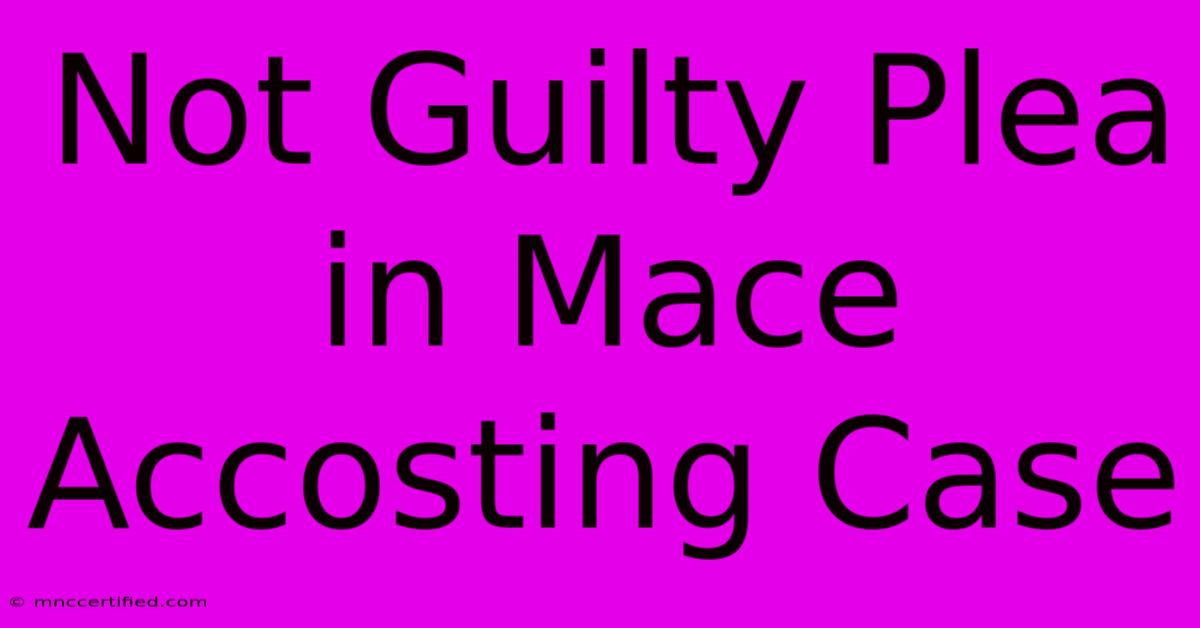Not Guilty Plea In Mace Accosting Case

Table of Contents
Not Guilty Plea in Mace Accosting Case: What You Need to Know
The recent not guilty plea entered in the mace accosting case has sparked significant public interest and raised important questions about self-defense, legal representation, and the complexities of assault charges. This article delves into the specifics of the case, explores the legal arguments likely to be presented, and examines the potential implications of the verdict.
Understanding the Case: The Allegations
The case revolves around an alleged incident where an individual, let's call them the defendant, used mace or pepper spray against another person (the alleged victim). The prosecution alleges that this act constituted an assault, a crime punishable under [insert relevant jurisdiction's law and statute number here, e.g., California Penal Code 240]. The core of the prosecution's case likely rests on proving beyond a reasonable doubt that the defendant:
- Intentionally inflicted injury: Did the defendant deliberately spray the mace, intending to cause harm?
- Lack of self-defense: Was the use of mace a necessary and proportionate response to an immediate threat, or was it excessive force?
- Lack of consent: Did the victim consent to being sprayed?
The prosecution will need to present evidence supporting each of these points to secure a conviction. This evidence might include witness testimony, police reports, medical records documenting the victim's injuries, and potentially video footage of the incident.
The "Not Guilty" Plea: What it Means
Entering a "not guilty" plea does not mean the defendant is proclaiming their innocence. It simply means the defendant is asserting their right to a trial, where the prosecution must prove their guilt beyond a reasonable doubt. The defendant is not obligated to prove their innocence. This plea allows the defense to present their case and challenge the prosecution's evidence.
Potential Defense Strategies
Several defense strategies could be employed in this mace accosting case:
1. Self-Defense Claim:
The defense might argue that the defendant used mace in self-defense. This would require demonstrating that:
- Imminent Threat: The defendant faced an immediate and credible threat of physical harm.
- Reasonable Force: The use of mace was a reasonable and proportionate response to the threat. The defense will likely argue the amount of mace used was necessary to neutralize the perceived threat.
- No Reasonable Retreat: The defendant couldn't safely retreat from the situation.
This requires a detailed examination of the circumstances leading up to the incident.
2. Mistake of Fact:
The defense might argue that the defendant acted under a mistaken belief about the circumstances. For example, they may claim they believed they were in imminent danger when they were not, or that the victim was about to attack them.
3. Lack of Intent:
The defense could argue that the defendant did not intend to cause harm, perhaps claiming accidental discharge or the mace being used in self-defense.
The Importance of Legal Representation
The outcome of this case heavily depends on the quality of legal representation for both the defendant and the prosecution. A skilled defense attorney will thoroughly investigate the facts, interview witnesses, and build a robust defense strategy. They will also ensure all procedural rights are upheld and challenge any evidence presented by the prosecution that they deem unreliable or inadmissible.
Implications and Future Developments
The outcome of this trial will have implications beyond the individuals directly involved. It could set precedents regarding the use of self-defense with mace or pepper spray and potentially influence future legal cases involving similar circumstances. The case will likely highlight the need for clear guidelines on the appropriate and legal use of self-defense sprays in public spaces.
The next steps will involve pretrial motions, discovery, and ultimately, the trial itself. The public should follow this case closely to understand how the courts weigh the evidence and interpret the laws surrounding self-defense and assault. Stay tuned for further updates.
Keywords: Mace accosting, not guilty plea, self-defense, assault charges, legal representation, pepper spray, trial, court case, legal implications, evidence, prosecution, defense, witness testimony, reasonable force, imminent threat, mistake of fact, [Insert relevant jurisdictional keywords, e.g., California Penal Code 240].

Thank you for visiting our website wich cover about Not Guilty Plea In Mace Accosting Case. We hope the information provided has been useful to you. Feel free to contact us if you have any questions or need further assistance. See you next time and dont miss to bookmark.
Featured Posts
-
James Doubtful Fridays Lakers Timberwolves
Dec 13, 2024
-
The Witcher 4 Initial Gameplay Glimpse
Dec 13, 2024
-
Wallen Sentenced Chair Throwing Case Plea
Dec 13, 2024
-
Witcher 4 Trailer Cd Projekt Confirms
Dec 13, 2024
-
Niners Criticize Campbells Rams Game Absence
Dec 13, 2024